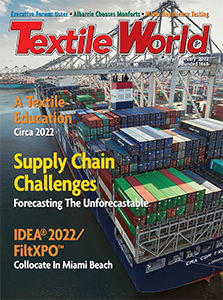The US presidential election is already casting a cloud over the textile world: In many newspapers
around the world, people are questioning if the newly elected US president, Barack Obama, will
tighten relations with the world. Particularly the Far East is quite afraid.
As everybody knows, rarely has an election in the United States attracted more attention
从世界其他地方比这个地方。在欣快感之后,世界各地
evaluating what this Obama victory means for them.
Don’t Export Jobs
During the campaign, candidate Obama said that he would discourage US companies that export
jobs — in other words, outsource — by taking away their tax breaks. For example, he would like to
北美自由贸易协定谈判(NAFTA) to strengthen its labor and
environmental provisions. He supports pressuring the World Trade Organization (WTO) to better
enforce agreements and halt government subsidies to foreign exporters, and imposing other
美国出口上的非关税障碍。他还想为总统的快速轨道提供面貌
trade negotiating authority to require prescreening of potential US free trade partners based on
their labor and environmental standards and other factors. All these factors point to the
当他上任时,他可能会携带贸易保护主义情绪 - 所以说
overall comments in the Far Eastern press.
What About The WTO?
It’s the old saying, “If the United States has a cough, the world has a cold.” In other
words, referring to the WTO, from past history it’s very well-known that the United States is
leading the pace for the global trade regime. When America was most dependent on agriculture and
the textile industry, those two areas remained largely outside the General Agreement on Tariffs and
Trade scope, while textiles were subjected to a special regime.
最近,劳动和环境,两个问题是民主党的核心
贸易政策进入了多边贸易阶段。似乎新总统将
continue to support the US engagement in the WTO and will support a successful conclusion of the
多哈回合。我想国会会赋予他快速的授权,但会加载条件
例如劳动和环境标准,可能会降低启动的阈值
action against subsidies, dumping and other unfair trade practices. This all would be in line with
正在进行的全球活动,包括与碳足迹有关的活动,以及更多的活动
favorable to Western textile standards.
What About The Asia-Pacific Rim?
However, labor and environmental standards are crucial for some developing countries. They
fear that these standards would be used to discriminate against their exports and legitimize action
similar to anti-dumping measures. That could complicate a resumption of negotiations.
But, what about the whole Asia-Pacific Rim? Will the Asia-Pacific Economic Cooperation
(APEC) forum help? APEC was established in 1989 to further enhance economic growth and prosperity
for the region and to strengthen the Asia-Pacific community. APEC claims to be the only
intergovernmental grouping in the world operating on the basis of non-binding commitments, open
dialogue and equal respect for the views of all participants. Unlike the WTO or other multilateral
贸易机构,APEC没有参与者要求的条约义务。APEC有21名成员
economies that account for more than one-third of the world’s population (2.6 billion people), more
超过世界总生产总值的50%,总计1,254亿美元,超过41
percent of world trade. APEC also represents the most economically dynamic region in the world,
having generated nearly 70 percent of global economic growth in its first 10 years. Will the new
president support APEC?
Under the reins of George W. Bush, the United States reduced its interest down to its main
business. The Asian community is scared the United States will continue to use APEC as a platform
to push its own trade policy interests. The world’s economic leaders are curious to know Obama’s
foreign trade policy. Trade policy is probably not at the top of Obama’s agenda; the financial
market and the economy are more important at the moment. However, the litmus test will come when
the agreement with China to limit its exports of certain categories of textiles and textile
products to the United States via quotas expes at the end of this year. However, the United States
will act as all other nations do, defending its own national interests.
November 11, 2008




